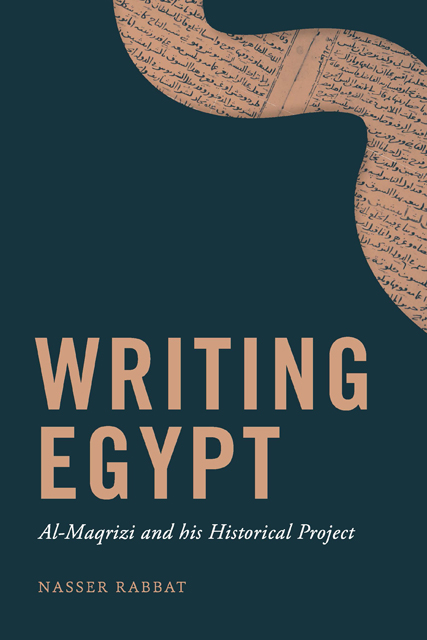Book contents
- Frontmatter
- Contents
- Preface
- List of Short References to Frequently Cited Primary Sources
- List of Abbreviations
- Notes on Transcription and Dates
- Introduction: A Singular Mamluk Historian
- Part 1 The Life of al-Maqrizi
- Part 2 The Writings of al-Maqrizi
- Part 3 The Afterlife of al-Maqrizi’s Writing
- In the Guise of a Conclusion: Becoming the Greatest Historian of Egypt
- Bibliography
- Index of Books Cited in the Text
- General Index
In the Guise of a Conclusion: Becoming the Greatest Historian of Egypt
Published online by Cambridge University Press: 02 June 2023
- Frontmatter
- Contents
- Preface
- List of Short References to Frequently Cited Primary Sources
- List of Abbreviations
- Notes on Transcription and Dates
- Introduction: A Singular Mamluk Historian
- Part 1 The Life of al-Maqrizi
- Part 2 The Writings of al-Maqrizi
- Part 3 The Afterlife of al-Maqrizi’s Writing
- In the Guise of a Conclusion: Becoming the Greatest Historian of Egypt
- Bibliography
- Index of Books Cited in the Text
- General Index
Summary
In a review of a biography of Susan Sontag in The New Yorker entitled “The Unholy Practice of Biography,” Janet Malcolm wrote:
Biographers often get fed up with their subjects, with whom they have become grotesquely overfamiliar. We know no one in life the way biographers know their subjects. It is an unholy practice, the telling of a life story that isn’t one’s own on the basis of oppressively massive quantities of random, not necessarily reliable information. The demands this makes on the practitioner’s powers of discrimination, as well as on his capacity for sympathy, may be impossible to fulfill.
I should know. Al-Maqrizi’s project stayed with me for too many years, during which I frustratingly decided to drop it several times. Then something would happen that would trigger my interest again. Finding more information about the man, his social milieu, his views and beliefs, and the aims of his history writing became a chronic passion. It required sifting through many thousands of pages of his vast historical oeuvre and of the texts of his many contemporary chroniclers and biographers as well as those writing about him in the modern period. Most offered only canned portrayals limited to a set of categories: places and dates of birth and death, teachers, books composed, positions held, patrons, etc. Some gossiped, but even the gossip was impersonal, skin-deep, and, naturally, often malicious. Even the most important junctures in his life, such as his switching madhhab upon reaching majority, his relationship with his patrons and peers, and his withdrawal and retreat to his family home, which were matter-of-factly reported, remained unexplained and uncontextualized. This dearth of personal material was not surprising, though. It was the norm in medieval Arabic historiography to avoid what we today crave and value, intimate details, except in the very rare cases when some idiosyncratic author, like Usama ibn Munqidh or Abu Shama, decides to hint at his inner life, thoughts, and feelings.
Al-Maqrizi, from the scattered bits about him we have in his historical work, was definitely such a singular character who marched to his own tune and did not shy away from expressing his controversial opinions. He nonetheless left no autobiography, not even a mashikhat as many of his famous colleagues did.
- Type
- Chapter
- Information
- Writing EgyptAl-Maqrizi and his Historical Project, pp. 284 - 287Publisher: Edinburgh University PressPrint publication year: 2023

